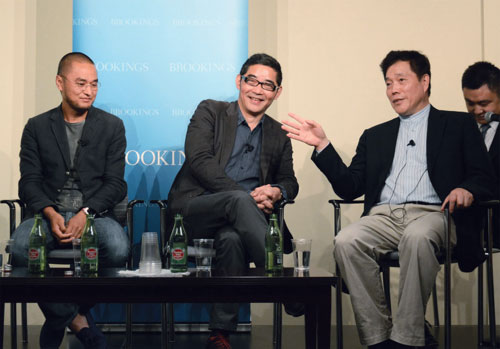Using literature as bilateral bridge
Literature can help build the bridge between China and the United States and promote mutual understanding, concluded a writers panel in Washington.
|
Feng Tang (left), Su Tong and Zhao Lihong, accomplished Chinese writers, discuss Chinese literature at the Brookings Institution in Washington on May 29. Liu Xiaoxian / for China Daily |
"The communication between Chinese and Western cultures has always been imbalanced," Zhao Lihong, a prominent Chinese poet and the director of the China Writers Association, said at the Brookings Institution on May 29.
"Over the century, lots of Western literature works, including American ones, have been continuously translated and introduced into China, but the US knows little about Chinese literature, especially contemporary literature," Zhao said.
"I hope the two countries could deepen their mutual understanding on the basis of equal dialogue in literature," he said.
Cheng Li, director of the John L. Thornton China Center at Brookings, echoed Zhao's view, saying that Sino-US communications should not only take place between high-ranking government officials but also in cultural and people-to-people exchanges.
Three accomplished Chinese writers, Zhao Lihong, Su Tong and Feng Tang, gathered at the Washington-based think tank to share their experiences as writers and their views on contemporary Chinese literature.
When the three were asked about their generations' defining features, Zhao, born in the 1950s, used the word "searching".
Su, born in the 1960s, described himself and his contemporaries as "independent".
Feng, born in the 1970s, used "growing" to describe a generation in a rapidly changing China.
"I never expected to be a writer and poet," said Zhao, once an educated youth who was sent to learn from peasants on Chongming Island during the "cultural revolution" (1966-1976). "Literature does not have a single standard approach, but is a process of persistent searching, pursuit and thinking."
Su, whose novel Wives and Concubines was adapted for the film Raise the Red Lantern by Zhang Yimou, stated that "independence" is a positive quality for writers.
He said his generation has been striving to "distinguish themselves from other writers," and many "follow their own blueprint, becoming their own keys to success".
Feng noted that his generation is facing a dramatically changing China, with challenges and opportunities created by new technology and media. As a result, they "experience dramatic changes emotionally and physically".
"I do believe in the practical use of literature," said Feng. "To understand a certain set of culture, we cannot only read IPO prospectuses or financial statements, but we need to read local novels."
Liu Xiaoxian in Washington contributed to this story.



















